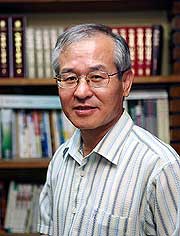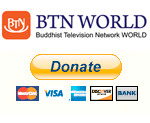
|
|
|
Home Asia Pacific North Asia S/N Korea News & Issues Korean don says newly empowered Christians should be socially responsibleUCAN, October 23, 2008
SEOUL, South Korea -- Christians, now the most influential community in South Korea, should use their power not to discriminate against others, but rather to show they are socially responsible, a Buddhist scholar says.
Park Gwang-seo, professor at Jesuit-run Sogang University in Seoul, worries that local Protestants seem to be discriminating against Buddhists. As evidence of this, Park, 59, cites recent actions of the government of President Lee Myung-bak, an elder of Somang Presbyterian Church in Seoul. Among controversies that have emerged since Lee took office on Feb. 25 are the appointment of Protestant pastors to high government office, inclusion of pastors in official functions, omission of Buddhist temples on a Seoul transportation map, and the head of the national police openly supporting Protestant evangelism. On Aug. 27, about 200,000 Buddhists from across the country held a protest rally in Seoul. Two weeks later, on Sept. 9, Lee expressed "regret" that the actions of some government officials have offended Buddhists.
Park serves as co-representative of Buddhist Solidarity for Reform, co-representative of the Korea Institute for Religious Freedom and a mediator of the National Human Rights Commission of Korea, an independent government-established organization. In the 2005 population census, 22.8 percent of people claimed to be Buddhists and 18.3 percent Protestants. Catholics formed the third-largest religious community, at 10.9 percent, but more than 40 percent of the 47 million South Koreans professed no religion. Park's commentary for UCA News follows: In Korea, a multicultural and multireligious society, it is essential to have an open mind and to respect different traditions and religions. But recent religious conflicts have hampered the country from achieving harmony. In August, about 200,000 Buddhists, including 10,000 Buddhist monks, held a protest rally in downtown Seoul, claiming the government of President Lee is discriminating against Buddhism and destroying the constitution. This rally, unprecedented in the history of local Buddhism, signifies that tension and mistrust between the government and Buddhists, or more correctly, between Protestantism and Buddhism, will not end soon. Many scholars attribute the recent conflict to fundamentalism among local Protestants who they see as disregarding other religions and cultures, and even boasting of their destruction. The conflict results from the exclusivity and aggressive missionary activities of local Protestantism, which has taught its faithful that "any difference from what we believe is wrong." Missionary activities should not offend people of other religions. But local Protestant aggression against traditional religions and culture has provoked people's antipathy and aversion to Protestantism. Aggressive actions have included burning temples, vandalizing statues of Buddha and Dangun (the legendary founder of Korea), and employing slogans such as "Jesus Heaven, Disbelief Hell!" It is a serious matter, because such aggression has not been committed by a few careless Protestants only. Since Lee's government came to power last February, the president and some of his government officials have shown a thoughtless bias against Buddhism in favor of Protestantism. This ignited the Buddhist protest. Religious conflicts in the country have persisted since the time of South Korea's first president, Rhee Syng-man (1948-1960), a Methodist elder. At that time, however, the country did not have many Christians. Moreover, religious rights or the principle of separation of religion and state were not high priorities. Economic development and democratization were more urgent social issues. Buddhism, the biggest religion in the country at that time, did not deal with religious tensions, because the country was suffering from internal conflicts. Local Buddhists did not properly address religious attacks but rather overlooked them. Today they are paying a high price for their tolerance. Now things have changed. Christianity is not a minority religion anymore. It has grown into the most influential religion in the country. That's why local Christians are asked to be socially responsible. Additionally, Buddhists can no longer tolerate unconstitutional discrimination against their religion and violation of their religious rights. On the other hand, Protestants do not appear to have any intention of stopping their mission. Rather, they initiated a Protestant political party [Christian Agape Party] to protect and extend their vested rights. Local Protestantism seems to have taken the road toward a "religion of power," which worries the nation. Lee's bias in favor of Protestantism was seen even when he was mayor of Seoul (2002-2006), when he dedicated the capital to God (at a Protestant prayer meeting in 2004). He also sent a congratulatory message to a meeting where young Protestants prayed for "the collapse of Buddhist temples." Consequently, his government is seen as one that aggravates religious conflicts. He appointed a Protestant pastor as presidential secretary, and then another Protestant pastor was named as a presidential officer. Moreover, Lee invited Reverend Cho Yong-gi of the Full Gospel Church to pray when U.S. President George W. Bush visited Seoul early August. Those incidents revealed he cannot administer the affairs of state without a pastor. Earlier, local Buddhists were also angry when the government's transport information system, Algoga (find your way), omitted all Buddhist temples on its Seoul map but included even small Protestant churches. While Eo Cheong-soo, head of the national police, openly supported Protestant police personnel's fasting prayers for the evangelization of the police force, his people stopped the car of Venerable Jikwan, head of Korean Buddhism, coming from his office and searched its trunk. I understand some of these could have arisen from unfortunate coincidences. But it is generally perceived that instances of religious discrimination against Buddhism are frequent because of Lee's strong bias. The greatest concern, however, is that Lee has never made a clear apology for incidents of religious bias against Buddhism, and apparently does not have any intention to do so. After the Aug. 27 Buddhist protest rally in downtown Seoul, he reportedly said, "I do not know what to apologize for." That makes me doubt whether this president intends to promote social integrity and protect the constitution by guaranteeing religious freedom and separation of religion and state. One indication that a society is underdeveloped is that people feel uncomfortable and discriminated against because of religion. Government officials, who are civil servants paid by the nation, should never forget that not only their policies but also their words and behavior can be regarded as acts asserting their power. Now, the whole nation should pay attention to saving its energy, which has been unnecessarily wasted. For this, we must first reveal cases of religious bias in the public sphere, such as in government and schools, bring these cases up for national debate and draw up a social agreement. |
 |
|
| Korean Buddhist News from BTN (Korean Language) |
|
 |
|
|
Please help keep the Buddhist Channel going |
|
| Point
your feed reader to this location |
|

 << Park Gwang-seo, a Buddhist professor at the Jesuit-run Sogang University in Seoul and co-representative of the Korea Institute for Religious Freedom.
<< Park Gwang-seo, a Buddhist professor at the Jesuit-run Sogang University in Seoul and co-representative of the Korea Institute for Religious Freedom.

